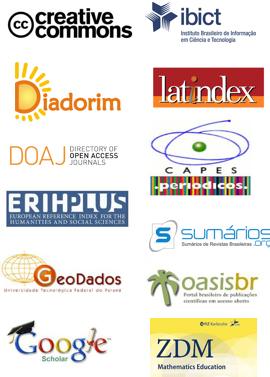A Interação Entre os Componentes Intuitivo, Algorítmico e Formal no Ensino dos Números Irracionais na Educação Básica
DOI:
https://doi.org/10.17921/2176-5634.2018v11n3p210-219Resumo
Este artigo contém considerações a respeito de possibilidades de articulação dos aspectos intuitivo, algorítmico e formal, na abordagem dos números irracionais, na Educação Básica. Nossos argumentos são fundamentados em Fischbein (1994) que defende a importância da integração desses três componentes na atividade matemática, a fim de desenvolver no estudante um raciocínio matemático eficaz. Apresentamos situações exemplares, que favorecem essa integração, destacando que uma abordagem dos irracionais nesse sentido pressupõe o desenvolvimento anterior de habilidades relativas aos racionais, igualmente voltadas para a exploração desses componentes. Finalmente, enfatizamos a relevância do estudo dos irracionais na Educação Básica, como etapa indispensável para a posterior compreensão da ampliação dos campos numéricos.
Palavras-chave: Números Irracionais. Componentes Intuitivo. Algorítmico e Formal.
Abstract
This article contains considerations regarding articulation possibilities of intuitive, algorithmic and formal aspects, in the approach of irrational numbers, in Basic Education. Our arguments are based on ischbein (1994) who argues that the importance of integrating these three components in mathematical activity, in order to develop an effective mathematical reasoning in a student. Here exemplary situations that favor such integration, noting that an approach of the irrational numbers presupposes the previous development of skills relating to rational, also focused on the exploration of these components. Finally, we emphasize the relevance of the study of the irrational numbers in Basic Education, as essential stage to the understanding of numeric fields expansion.
Keywords: Irrational Numbers. Components Intuitive, Algorithmic and Formal.
Referências
Boyer, CB. (1996). História da Matemática. São Paulo: Edgard
Blücher.
Brasil. Secretaria de Educação Fundamental. (1998). Parâmetros
Curriculares Nacionais Terceiro e Quarto Ciclos do Ensino
Fundamental: Matemática. Brasília: MEC.
Corbo, O. (2012). Um estudo sobre os conhecimentos necessários
ao professor de matemática para a exploração de noções
concernentes aos números irracionais na Educação Básica.
Tese (Doutorado em Educação Matemática). São Paulo:
UNIBAN.
Courant R, & Robbins, H. (2000). O que é Matemática? Rio de
Janeiro: Ciência Moderna.
Fischbein, E. (1994). The interaction between the formal, the
algorithmic and the intuitive components in a mathematical
activity, (pp.231-5). In: Didactics of Mathematics as a
Scientific Discipline. Mathematics Education Library.
Dordrecht: Kluwer Academic Publishers.
Niven, I. Números: racionais e irracionais. (1984). Rio de
Janeiro: Sociedade Brasileira de Matemática.
Sirotic, N. & Zazkis, R, (2005). Locating Irrational Numbers on
the number line. In: Proceedings of the 27 th annual meeting
of the North American Chapter of the International Group for
the Psychology of Mathematics Education.
Tall, David. (1979). Cognitive aspects of proof, with special
reference to the irrationality of , (pp.206-7). In: Proceedings
of the Third International Conference for the Psychology of
Mathematics Education, Warwick.
Tall, DO, Schwarzenberger, RLE. (1978). Conflicts in the learning
of real numbers and limits. Mathematics Teaching, 82, 44-49.


